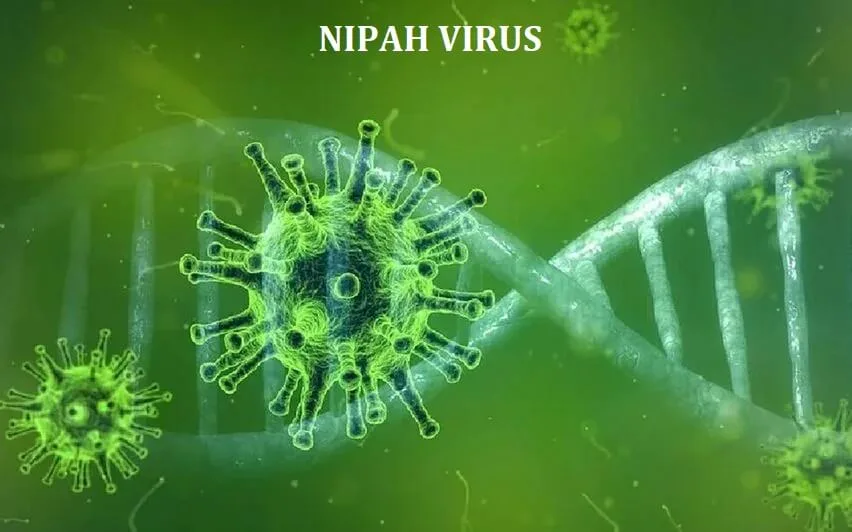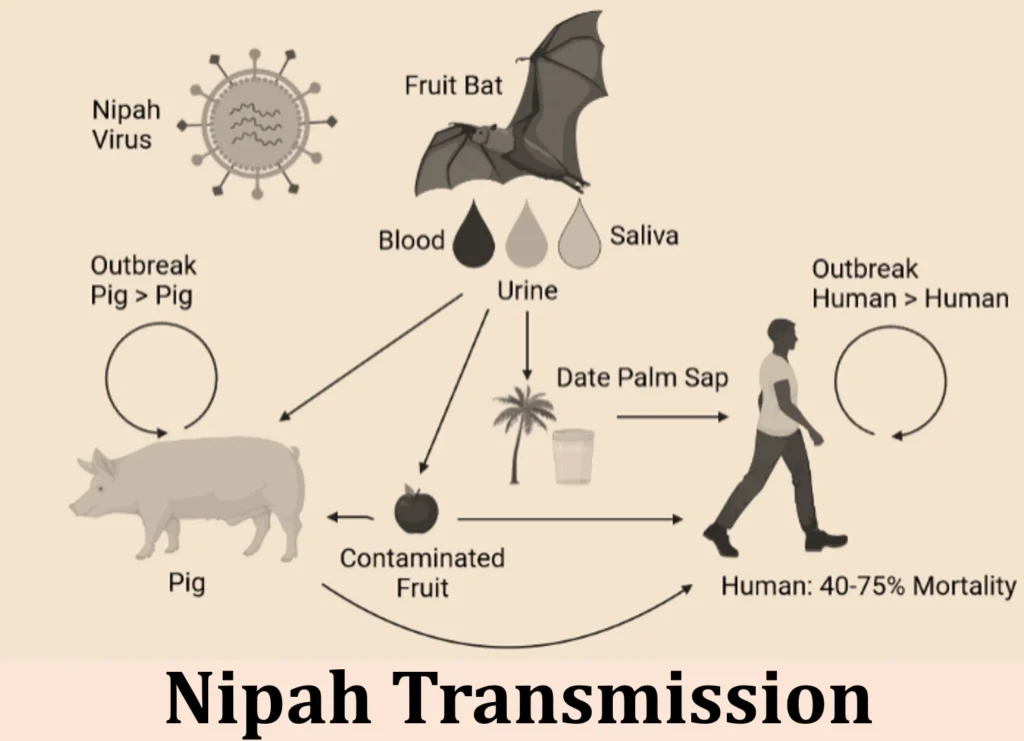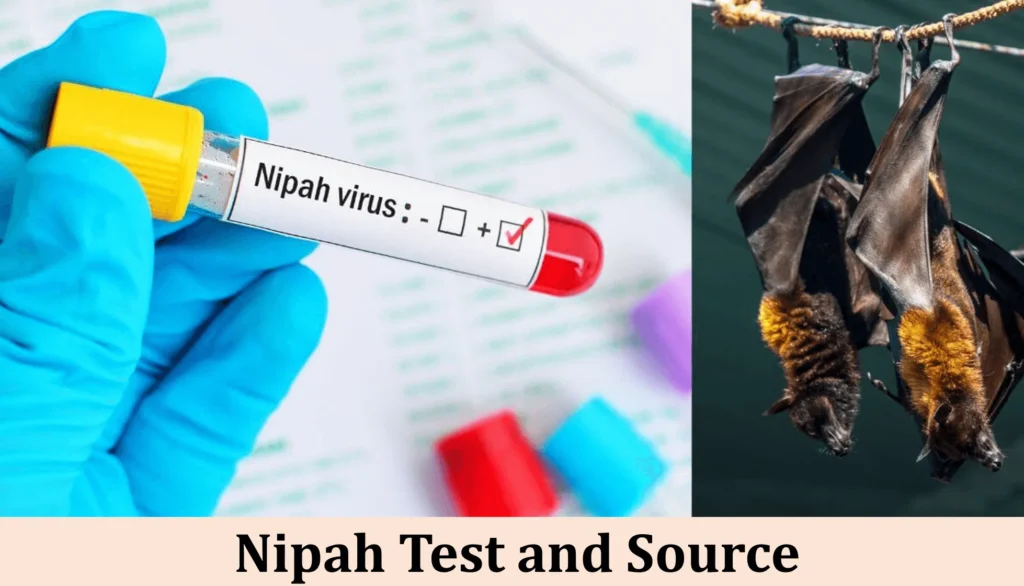 Nipah virus is a serious illness, and even though it doesn’t happen a lot, it can make many people unwell when it does. It becomes a matter of concern as it can spread from animals to humans. Through this article I’ll take a chance to inform you about the origin of this virus. I’ll also try to answer question like how it spread, how to treat an infected patient etc.
Nipah virus is a serious illness, and even though it doesn’t happen a lot, it can make many people unwell when it does. It becomes a matter of concern as it can spread from animals to humans. Through this article I’ll take a chance to inform you about the origin of this virus. I’ll also try to answer question like how it spread, how to treat an infected patient etc.
Origin of Nipah Virus
In 1999, a big outbreak of the Nipah virus in Malaysia and Singapore made people all around the world notice this sickness for the first time. This virus is considered harmful as it causes serious health issues. It started with people who worked with pigs or were close to them, and since then, it’s been a tough problem. According to the experts the source of origin of this virus are bats, pigs or other infected people. They also express that it spreads through body fluids. Right now, there aren’t any medicines or shots that can help with this puzzling virus.

Symptoms of Nipah virus
The signs and symptoms of Nipah virus infection might differ. Sometimes people may not exhibit any symptoms at all. But when symptoms do appear, they can be anything from minor to major. Following are some typical signs of Nipah virus infection mentioned by World Health Organization, an International health agency:
- Fever: The majority of Nipah virus patients get a high fever.
- Headache: Severe headaches are a common symptom.
- Cough: Some individuals may experience a cough, similar to a respiratory infection.
- Drowsiness: Feelings of drowsiness or confusion can occur.
- Disorientation: This virus can cause disorientation and confusion in the patients.
- Neurological disorder: As the percentage of infection increases in the patients it can impact the nervous system causing neurological disorder.
- Seizures: In extreme instances, seizures or shocks are conceivable.
- Coma: In the most severe cases, the patient may reach the state of Coma.
- Respiratory Issues: Issues with the respiratory system i.e., acute respiratory distress can be life-threatening in certain people.
- Vomiting: Nausea and vomiting are also possible symptoms.
Remember that Nipah virus infections can spread swiftly and, in severe cases, cause encephalitis (brain inflammation) and death. It is critical to seek medical care right once if someone displays these symptoms.
Measures to be taken for an Infected Person
It is critical to act quickly to give the necessary medical care if a person is suspected or proven to be infected. Let’s Take the following actions:
- Isolation: The infected person should be isolated from others to prevent the spread of the virus. They should be placed in a separate room with dedicated caregivers and healthcare workers wearing appropriate protective gear.
- Medical Evaluation: Seek medical attention from healthcare professionals who are trained to handle infectious diseases. Early diagnosis becomes critical in case of Nipah Infection as it spreads at an alarming rate.

- Supportive Care: There is no specific antiviral treatment for Nipah virus infection. Therefore, medical care primarily focuses on providing supportive care. This include treating symptoms including fever, breathing difficulties, and neurological problems.
- Hydration: Ensure the infected person stays well-hydrated by providing fluids intravenously (IV) if necessary, as vomiting and diarrhea can lead to dehydration.
- Respiratory Support: Mechanical ventilation or oxygen therapy becomes necessary when the case is severe. This assists the patient in breathing.
- Preventive Measures: Healthcare workers and caregivers must take strict infection control measures to prevent transmission. These measures include the use of gloves, masks, special clothing and protective glasses. Moreover, the use of hand sanitizers is the most important among all.
- Contact Tracing: Identify and monitor individuals who have had close contact with the infected person to prevent further spread. Quarantine measures may be necessary for those at risk.
- Public Health Authorities: Inform local public health authorities about the case to coordinate response efforts and contact tracing.
- Patient Isolation: The infected person should remain isolated until they are no longer contagious, as determined by medical professionals and public health authorities.
- Research and Reporting: The infected cases must be reported to the appropriate authorities. This will help the doctors and scientist to learn more about it. Further it can prevent the disease from becoming an epidemic.
It’s crucial to stress that spotting Nipah virus early and getting medical help right away is essential. You can also stop Nipah from spreading by being careful to avoid things that might expose you to the virus.
Preventing Outbreak of Nipah Virus
In order to protect our societies from this virus, here’s what you can do:
- Avoid Close Contact with Infected Animals: Do not handle or consume animals that are sick or have died from unknown causes.
- Practice Good Hygiene: Wash your hands frequently with soap and water, especially after handling animals or being in areas with potential exposure to the virus. Use hand sanitizer if soap and water are not available.
- Cook Meat Thoroughly: Cooking the raw meat properly at an appropriate temperature kills any potential virus.
- Wear Protective Clothing: If you need to care for a sick person with Nipah virus or handle their bodily fluids, wear appropriate protective clothing, including gloves, masks, gowns, and goggles.
- Isolation and Quarantine: Isolate infected individuals to prevent transmission to others. Quarantine individuals who have had close contact with infected individuals.
- Healthcare Worker Safety: Healthcare workers should follow strict infection control measures, including using personal protective equipment (PPE) and practicing proper hand hygiene.
- Public Health Surveillance: Enhance surveillance and reporting of Nipah virus cases to quickly identify and isolate infected individuals and trace contacts.
- Educate Communities: Raise awareness about Nipah virus, its transmission and preventive measures within affected communities. Promote safe practices, especially in areas with a history of Nipah outbreaks. In order to do so you can share this blog with people in your contact.
- Research and Vaccine Development: Support research efforts to develop vaccines and treatments for Nipah virus.
- Travel Precautions: Travelers to regions with known Nipah outbreaks should exercise caution and avoid contact with sick animals and bats.
It is necessary to stay informed about Nipah virus outbreaks and follow guidance from local health authorities. It’s vital to remember that outbreaks of the Nipah virus are uncommon but can be severe, and that there isn’t presently a particular antiviral medication available to treat them. Preventative measures and early detection are thus necessary to reduce the risk of Nipah virus transmission and the severity of outbreaks.
Conclusion
Although Nipah Virus is rare, but it is terrible. It is rather frightful that it may arise from animals and infect humans. Through this blog post I have tried to cover all the aspects associated with this Virus. It will surely help each one of you to be aware of the do’s and don’ts linked to this virus. Despite the Nipah being dangerous to the human civilization but by cooperation and research we can overcome the adverse situation. Be cautious, keep learning, and help one another.

